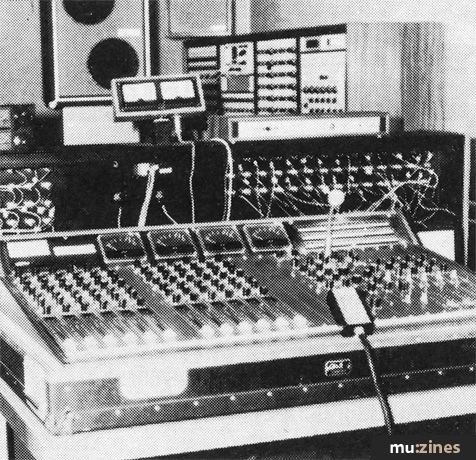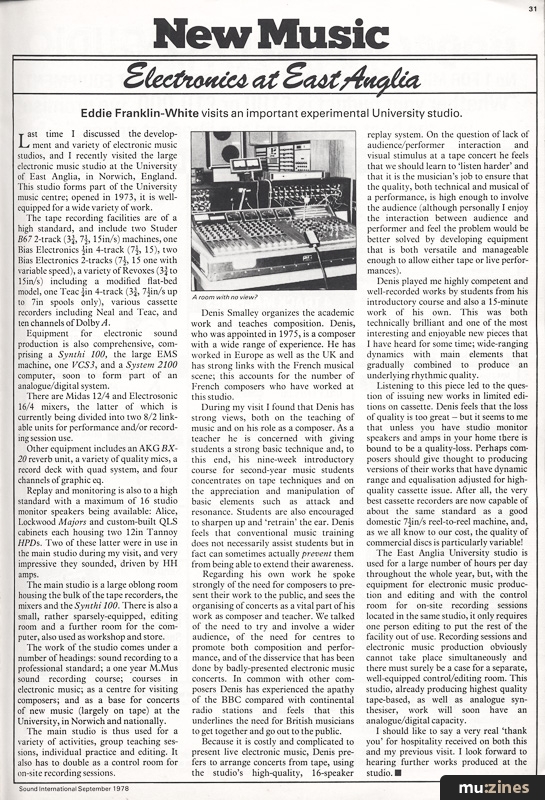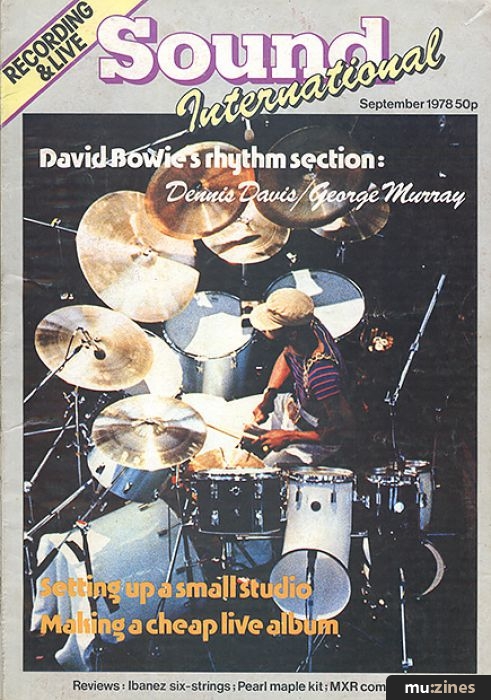Magazine Archive
Home -> Magazines -> Issues -> Articles in this issue -> View
New Music | |
Electronics at East AngliaArticle from Sound International, September 1978 | |
A report on the electronic music studio at the University of East Anglia.
Eddie Franklin-White visits an important experimental University studio.

A room with no view?
Last time I discussed the development and variety of electronic music studios, and I recently visited the large electronic music studio at the University of East Anglia, in Norwich, England. This studio forms part of the University music centre; opened in 1973, it is well-equipped for a wide variety of work.
The tape recording facilities are of a high standard, and include two Studer B67 2-track (3¾, 7½, 15in/s) machines, one Bias Electronics ½in 4-track (7½, 15), two Bias Electronics 2-tracks (7½, 15 one with variable speed), a variety of Revoxes (3¾ to 15in/s) including a modified flat-bed model, one Teac ¼in 4-track (3¾, 7½in/s up to 7in spools only), various cassette recorders including Neal and Teac, and ten channels of Dolby A.
Equipment for electronic sound production is also comprehensive, comprising a Synthi 100, the large EMS machine, one VCS3, and a System 2100 computer, soon to form part of an analogue/digital system.
There are Midas 12/4 and Electrosonic 16/4 mixers, the latter of which is currently being divided into two 8/2 linkable units for performance and/or recording session use.
Other equipment includes an AKG BX-20 reverb unit, a variety of quality mics, a record deck with quad system, and four channels of graphic eq.
Replay and monitoring is also to a high standard with a maximum of 16 studio monitor speakers being available: Alice, Lockwood Majors and custom-built QLS cabinets each housing two 12in Tannoy HPDs. Two of these latter were in use in the main studio during my visit, and very impressive they sounded, driven by HH amps.
The main studio is a large oblong room housing the bulk of the tape recorders, the mixers and the Synthi 100. There is also a small, rather sparsely-equipped, editing room and a further room for the computer, also used as workshop and store.
The work of the studio comes under a number of headings: sound recording to a professional standard; a one year M.Mus sound recording course; courses in electronic music; as a centre for visiting composers; and as a base for concerts of new music (largely on tape) at the University, in Norwich and nationally.
The main studio is thus used for a variety of activities, group teaching sessions, individual practice and editing. It also has to double as a control room for on-site recording sessions.
Denis Smalley organizes the academic work and teaches composition. Denis, who was appointed in 1975, is a composer with a wide range of experience. He has worked in Europe as well as the UK and has strong links with the French musical scene; this accounts for the number of French composers who have worked at this studio.
During my visit I found that Denis has strong views, both on the teaching of music and on his role as a composer. As a teacher he is concerned with giving students a strong basic technique and, to this end, his nine-week introductory course for second-year music students concentrates on tape techniques and on the appreciation and manipulation of basic elements such as attack and resonance. Students are also encouraged to sharpen up and 'retrain' the ear. Denis feels that conventional music training does not necessarily assist students but in fact can sometimes actually prevent them from being able to extend their awareness.
Regarding his own work he spoke strongly of the need for composers to present their work to the public, and sees the organising of concerts as a vital part of his work as composer and teacher. We talked of the need to try and involve a wider audience, of the need for centres to promote both composition and performance, and of the disservice that has been done by badly-presented electronic music concerts. In common with other composers Denis has experienced the apathy of the BBC compared with continental radio stations and feels that this underlines the need for British musicians to get together and go out to the public.
Because it is costly and complicated to present live electronic music, Denis prefers to arrange concerts from tape, using the studio's high-quality, 16-speaker replay system. On the question of lack of audience/performer interaction and visual stimulus at a tape concert he feels that we should learn to 'listen harder' and that it is the musician's job to ensure that the quality, both technical and musical of a performance, is high enough to involve the audience (although personally I enjoy the interaction between audience and performer and feel the problem would be better solved by developing equipment that is both versatile and manageable enough to allow either tape or live performances).
Denis played me highly competent and well-recorded works by students from his introductory course and also a 15-minute work of his own. This was both technically brilliant and one of the most interesting and enjoyable new pieces that I have heard for some time; wide-ranging dynamics with main elements that gradually combined to produce an underlying rhythmic quality.
Listening to this piece led to the question of issuing new works in limited editions on cassette. Denis feels that the loss of quality is too great — but it seems to me that unless you have studio monitor speakers and amps in your home there is bound to be a quality-loss. Perhaps composers should give thought to producing versions of their works that have dynamic range and equalisation adjusted for high-quality cassette issue. After all, the very best cassette recorders are now capable of about the same standard as a good domestic 7½in/s reel-to-reel machine, and, as we all know to our cost, the quality of commercial discs is particularly variable!
The East Anglia University studio is used for a large number of hours per day throughout the whole year, but, with the equipment for electronic music production and editing and with the control room for on-site recording sessions located in the same studio, it only requires one person editing to put the rest of the facility out of use. Recording sessions and electronic music production obviously cannot take place simultaneously and there must surely be a case for a separate, well-equipped control/editing room. This studio, already producing highest quality tape-based, as well as analogue synthesiser, work will soon have an analogue/digital capacity.
I should like to say a very real 'thank you' for hospitality received on both this and my previous visit. I look forward to hearing further works produced at the studio.
More from these topics
 Gateway Multitrack Course |
Studio Diary |
Paradise Re-Found - Southlands Studio |
Commercial break |
Studio Of The Month - Terminal Studios |
Studio Staff reveal - Facts on the Rak |
You Can Make It If You Try (Part 1) |
The Vinyl Solution |
Training and Education - For Recording Engineering |
Going Solo |
The Ultimate Garage Studio - Solo Sound |
Studio Focus - Treetop Avenue Studio, Ipswich |
Browse by Topic:
Education
Recording Studios
Publisher: Sound International - Link House Publications
The current copyright owner/s of this content may differ from the originally published copyright notice.
More details on copyright ownership...
Feature by Eddie Franklin-White
Help Support The Things You Love
mu:zines is the result of thousands of hours of effort, and will require many thousands more going forward to reach our goals of getting all this content online.
If you value this resource, you can support this project - it really helps!
Donations for April 2024
Issues donated this month: 0
New issues that have been donated or scanned for us this month.
Funds donated this month: £7.00
All donations and support are gratefully appreciated - thank you.
Magazines Needed - Can You Help?
Do you have any of these magazine issues?
If so, and you can donate, lend or scan them to help complete our archive, please get in touch via the Contribute page - thanks!













